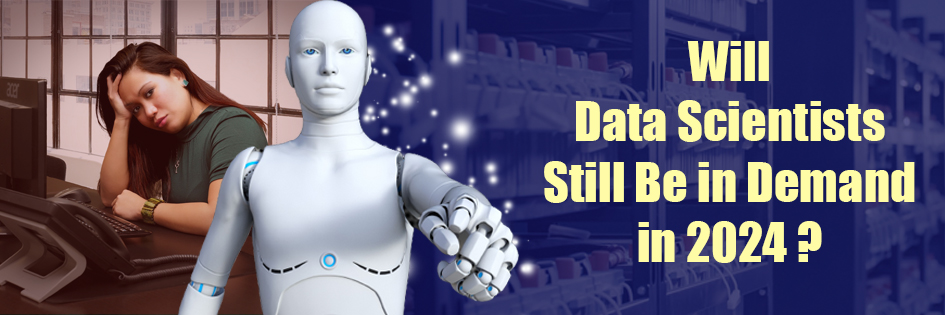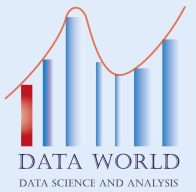
Recently, people have been flocking to study data science, and this science has become the most popular and sought-after science in the last two years.
The demand for higher degrees in data science has spread widely and rapidly, and online training courses have become abundantly available, and it has become increasingly popular to obtain data science certificates, as is the case on Datacamp, Udemy and Coursera sites, thus delving into the field of business accurately and proficiently.
However, this noise began to fade among some skeptics about the extent of the continuity of demand for this type of science.
Some statistics have talked about a diminishing in the size of the huge halo formed by data science compared to the past years and considered that data science was a passing event that will disappear to be replaced by a new, more advanced science.
Through some articles, these statistics dealt with the work of urging researchers to learn data technology to work in a field related to data engineering, the science that will be a continuation of data science, but in an advanced form about it.
One of the researchers says with great passion and interest about the continuity of data science as one of the most important sciences of the era that through his continuous research, a preliminary vision was formed that showed data science workers, especially beginners, who are scattered and confused about the feasibility of continuing to work in this science.
In the midst of this chaos in estimating the extent to which data science can continue at the same pace that it was at in its aspects, we have three questions that we must answer, perhaps they will be the way to cut doubt with certainty:
1) Will data engineering become an inevitable alternative to data science and thus data engineer becomes more in demand than data scientist?
2) With its rapid development, will machine learning technologies take the place of the data scientist?
3) Is the ability to obtain a job in data science still as important as it was in the midst of this rapid development in the data space, both quantitatively and qualitatively.
Comparing data science and data engineering:
The above-mentioned researcher resumes and says: After continuous and diligent research and several comparisons between those who adopt the idea of data engineering dominating data science, which is popular in the near future, and those who see that data science is the main pillar for dealing with data of all kinds, it turns out that the two fields are no less important, one than the other. . In other words, we cannot be certain that data engineering is an alternative to data science.
This conclusion began to be treated by observing the reliance of companies, especially large ones, on data engineers to deal with various types of data and employ them for optimal use.
Then comes the role of data scientists, as the analysts transform that data into a profitable component by which these companies reach the desired result.
With this important role of data scientists in creating the profitable value of organizations, they were not able to deal with the huge amount of random data flowing in a short time. These two functions are complementary to each other and each has its own mission.
The merits of this research create for us an important question that cannot be overlooked, is it possible for automation to take the role of data scientists?
The answer to this question leads us to identify the effectiveness of the tools that companies adopt in building their predictive models, and can these tools perform the tasks of data scientists? For example, can DataRobot technology help analysts produce predictive models like data scientists do without machine learning?
By delving deeply into the effectiveness of this tool specifically, we arrive at two points:
1) This tool has complete flexibility to use, especially with regard to importing data in all its formats and dealing with it quite easily.
2) This tool can find the typical value from among a set of branched data to produce a final value with high accuracy, which saves time and effort.
With these distinct capabilities of machine learning, it is not possible in any way to complete the work without the expertise of data scientists in the long run, as their task in accomplishing other tasks such as adding weights for features and some other functions that prepare to complete the work cannot be neglected in one way or another.
Each stage of data processing has a special function, and this is what data scientists do in terms of detailing, sorting and coordinating data according to the data and requirements. Hence, the consolidation of the essential role of human judgment when dealing with these technologies, however, it is difficult to automate a large part of the jobs by data scientists.
All these data confirm that the availability of human expertise when working with software technologies that speed up the completion of tasks makes the work integrated and indivisible, and therefore neither of them can replace the other.
And by highlighting the content of our research comes the most important question: Is there still demand for data scientists?
Statistics for the year 2020 prove that one person can produce data at a rate of 1.7 megabytes per second.
Data has an effective role in developing the industrial structure in all its forms, including, for example, following up on marketing operations so that through data points we can develop the progress of the marketing process, reach optimal targeting plans, and monitor the audience’s interaction with the marketing material.
All of these tasks cannot be performed by the data analyst alone. Automated and software techniques have a major role in accomplishing these functions, but they cannot negate the role of the data analyst and his practical experience in completing the required work. What distinguishes the data scientist is his practical skills that are completely different from the data science students from Theoretically.
Practical experience is the basis for dealing with data. The summary of benefiting from theoretical information is to employ it practically on the ground and the art of dealing with all possibilities and finding a solution to the obstacles that a data scientist encounters during his work. If this person possesses those skills, his scientific and practical value cannot be ignored.
We conclude from the foregoing that all the development of information technology is not able in any way to cancel data science and therefore talk about the beginning of the disappearance of this science is unfounded.
We have seen that companies still rely on data science experts to find solutions and overcome obstacles that machine learning cannot accomplish alone, but in addition to that, there is no automated technology that can take the role of a data scientist with its expertise and skills.
هل سيستمر الطلب على علماء البيانات في عام 2024 ؟

أصبح الناس يتهافتون في الآونة الأخيرة على دراسة علم البيانات وأصبح هذا العلم علم العصر والأكثر شيوعاً وطلباً في السنتين الأخيرتين . وانتشر الطلب على الشهادات العليا في علوم البيانات على نطاق واسع وبشكل متسارع وتوفرت الدورات التدريبية على شبكة الإنترنت بكثرة وأصبح الإقبال عليها بشكل متزايد للحصول على شهادات علم البيانات
Datacamp و Udemy و Coursera كما هو الحال على مواقع
وبالتالي الخوض في مجال الأعمال بدقة وإتقان
إلا أن هذا الضجيج بدأت يتخافت عند بعض المشككين في مدى استمرارية الطلب على هذا النوع من العلوم
فقد تحدثت بعض الإحصائيات عن تضاؤل في حجم الهالة الضخمة التي شكلها علم البيانات مقارنة بالسنوات المنصرمة واعتبرت أن علم البيانات كان حدثاً عابراً سيختفي ليحل مكانه علم جديد أكثر تطوراً
وقد تناولت هذه الإحصائيات عبر بعض المقالات العمل على حث الباحثين عن تعلم تكنولوجيا البيانات على العمل في مجال يخص هندسة البيانات العلم الذي سيكون استمراراً لعلم البيانات ولكن بشكل مطوّر عنها . يقول أحد الباحثين بشغف واهتمام كبيرين عن مدى استمرارية علم البيانات كأحد أهم علوم العصر أنه من خلال بحثه المستمر تشكلت عنده رؤية أولية أظهرت العاملين في علم البيانات وخاصة المبتدئين مشتتين وهم في حيرة من أمرهم حيال جدوى الاستمرار في العمل في هذا العلم
وفي خضم هذه الفوضى في تقدير مدى قابلية علم البيانات على الاستمرار بنفس الوتيرة التي كان عليها في أوجه تتشكل لدينا ثلاثة أسئلة يتحتم علينا الإجابة عليها لعلها تكون السبيل لقطع الشك باليقين
هل ستصبح هندسة البيانات بديلاً حتمياً لعلم البيانات وبالتالي يصبح مهندس البيانات أكثر طلباً من عالِم البيانات ؟ *
مع تطورها بشكل متسارع هل ستأخذ تقنيات التعلم الآلي مكان عالِم البيانات ؟ *
هل ما زالت قابلية الحصول على وظيفة في علم البيانات بنفس الأهمية التي كانت عليها في خضم هذا التطور المتسارع في فضاء البيانات كماً ونوعاً
وبالمقارنة بين علم البيانات وهندسة البينات
يستأنف الباحث المذكور أعلاه ويقول : بعد البحث المستمر والدؤوب وإجراءات عدة مقارنات بين المتبنين لفكرة سيطرة هندسة البيانات على علم البيانات هي الرائجة في المستقبل القريب وبين من يرون أن علم البيانات هو الركيزة الأساسية للتعامل مع البيانات بكافة أنواعها تبين أن المجالين لا تقل أهمية أحدهما عن الآخر . بمعنى آخر لا نستطيع أن نجزم أن هندسة البيانات هي بديل عن علم البيانات
هذا الاستنتاج بدأت تتضح معامله من خلال ملاحظة اعتماد الشركات ولاسيما الكبرى منها على مهندسي البيانات للتعامل مع مختلف أنواع البيانات وتوظيفها للاستخدام الأمثل ثم يأتي دور علماء البيانات إذ يقوم المحللون بتحويل تلك البيانات إلى مكوِّن ربحي تصل به تلك الشركات إلى النتيجة المرجوة
ومع هذا الدور المهم لعلماء البيانات في تكوين القيمة الربحية للمؤسسات إلا أنهم لم يكونوا قادرين على التعامل مع الكم الهائل من البيانات العشوائية المتدفقة خلال وقت قصير فالتحضير النموذجي لتلك البيانات لم يكن مثالياً بما يكفي مما اضطر هذه الفعاليات التجارية بالاستعانة بمهندسي البيانات ومن هنا تنطلق نظرية أن هتين الوظيفيتين مكملتان لبعضهما ولكل منهما مهمته الخاصة
تخلق لنا حيثيات هذا البحث استفساراً مهماً لا يمكن التغاضي عنه هو هل يمكن للأتمتة أن تأخذ دور علماء البيانات ؟ تقودنا الإجابة عن هذا السؤال إلى التعرف على فاعلية الأدوات التي تعتمدها الشركات في بناء نماذجها التنبؤية وهل يمكن لهذه الأدوات أن تقوم بمهام علماء البيانات ؟
DataRobot فعلى سبيل المثال هل يمكن لتقنية
أن تساعد المحللين على إنتاج نماذج تنبؤية كتلك التي يقوم بها علماء البيانات بالاستغناء عن تقنيات التعلم الآلي ؟
: وبالخوض عميقاً بمدى فاعلية هذه الأداة على وجه التحديد نتوصل إلى نقطتين
تتمتع هذه الأداة بمرونة تامة بالاستخدام وخاصة فيما يتعلق باستيراد البيانات بكافة تنسيقاتها والتعامل معها بسهولة تامة *
بإمكان هذه الأداة إيجاد القيمة النموذجية من بين مجموعة بيانات متفرعة لإخراج قيمة نهائية بدقة عالية مما يوفر من الوقت والجهد *
ومع هذه الإمكانيات المتميزة للتعلم الآلي لا يمكن بشكل من الأشكال من إتمام العمل بدون خبرات علماء البيانات على المدى البعيد , إذ أن مهمتهم في إنجاز المهام الأخرى كإضافة الأوزان للميزات وبعض الوظائف الأخرى التي تهيء لإتمام العمل لا يمكن إهمالها بشكل أو بآخر
فلكل مرحلة من مراحل معالجة البيانات وظيفة خاصة وهذا ما يفعله علما البيانات من تفصيل وفرز وتنسيق للبيانات وفقاً للمعطيات والمتطلبات ومن هنا يأتي ترسيخ الدور الأساسي للتقدير البشري عند التعامل مع تلك التقنيات ومع هذا من الصعب أتمتة جزء كبير من الوظائف من قِبل علماء البيانات
كل هذه المعطيات تؤكد أن توفر الخبرة البشرية عند العمل بالتقنيات البرمجية التي تسرع إنجاز المهام يجعل العمل متكامل لا يتجزأ وبالتالي لا يمكن لأحدهما أن يحل مكان الآخر
وبتسليط الضوء على مضمون بحثنا يأتي السؤال الأهم : هل مازال الطلب على علماء البيانات ؟
أثبتت إحصائيات عام 2020 أن بمقدور الشخص الواحد إنتاج بيانات بمعدل 1.7 ميغا بايت في الثانية
وللبيانات دور فعال في تطوير البنية الصناعية بشتى أشكالها بما فيها على سبيل المثال متابعة عمليات التسويق بحيث نستطيع من خلال نقاط البيانات تطوير سير العملية التسويقية والوصول إلى خطط الاستهداف الأمثل و مراقبة تفاعل الجمهور مع المادة التسويقية
كل هذه المهام لا يمكن لمحلل البيانات القيام بها بمفرده فالتقنيات الآلية والبرمجية لها دور كبير في إنجاز تلك الوظائف لكنها لا يمكن لها أن تلغي دور محلل البيانات وخبرته العملية في إتمام العمل المطلوب فما يميز عالِم البيانات هو مهاراته العملية التي تختلف تماماً عن دارسي علم البيانات من الناحية النظرية
فالخبرة العملية هي الأساس في التعامل مع البيانات فخلاصة الاستفادة من المعلومات النظرية هو توظيفها عملياً على أرض الواقع وفن التعامل مع كافة الاحتمالات وإيجاد حل للعوائق التي تعترض عالِم البيانات أثناء عمله فإن كان هذا الشخص يمتلك تلك المهارات فلا يمكن تجاهل قيمته العلمية والعملية
نستنتج من خلال ما سبق أن كل ما تشهده تكنولوجيا المعلومات من تطور لا يمكن لها بشكل من الأشكال أن تلغي علم البيانات وبالتالي الحديث عن بدء تلاشي هذا العلم لا أساس له من الصحة
ورأينا أن الشركات لازالت تعتمد على خبراء علم البيانات في إيجاد الحلول وتذليل العوائق التي لا يمكن للتعلم الآلي أن ينجزها بمفرده بل أضف إلى ذلك أنه لا يوجد تقنية آلية يمكنها أن تأخذ دور عالِم البيانات بما يمتلك من خبرات ومهارات


You must be logged in to post a comment.